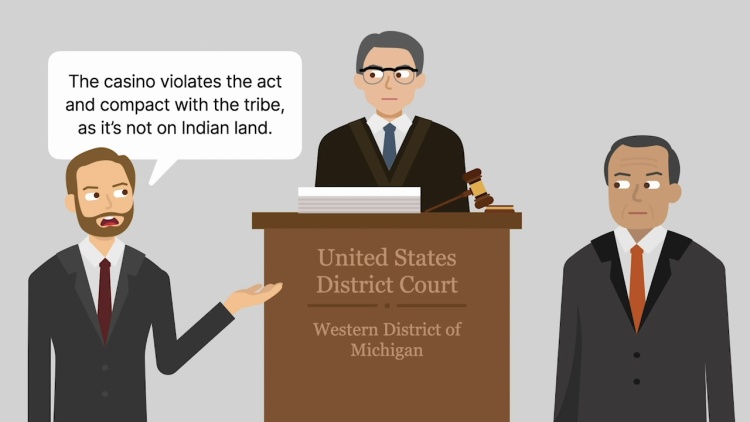Michigan v. Bay Mills Indian Community
United States Supreme Court
572 U.S. 782, 134 S. Ct. 2024 (2014)
- Written by Lauren Groth, JD
Facts
Under the Indian Gaming Regulatory Act (IGRA), 25 U.S.C. § 2701 et seq., an Indian tribe may conduct gaming on Indian land only pursuant to a compact with the surrounding state. In 1993, the State of Michigan (plaintiff) and the Bay Mills Indian Community (Bay Mills) (defendant) entered into a compact regarding Indian gaming. The compact permitted Bay Mills to operate a casino on reservation land, but prohibited gaming on land owned by Michigan. Neither party to the compact waived sovereign immunity. In 2010, Bay Mills opened a casino on land owned by Michigan, which Bay Mills claimed as tribal, ancestral land. Invoking both the compact and IGRA, Michigan sued in federal court to enjoin Bay Mills from operating the casino outside tribal land. The district court issued a preliminary injunction against Bay Mills and closed the casino. Bay Mills filed an interlocutory appeal. The United States Court of Appeals for the Sixth Circuit reversed, holding that Bay Mills was protected against suit by tribal sovereign immunity. The United States Supreme Court granted certiorari.
Rule of Law
Issue
Holding and Reasoning (Kagan, J.)
Concurrence (Sotomayor, J.)
Dissent (Scalia, J.)
Dissent (Thomas, J.)
Dissent (Ginsburg, J.)
What to do next…
Here's why 907,000 law students have relied on our case briefs:
- Written by law professors and practitioners, not other law students. 47,100 briefs, keyed to 996 casebooks. Top-notch customer support.
- The right amount of information, includes the facts, issues, rule of law, holding and reasoning, and any concurrences and dissents.
- Access in your classes, works on your mobile and tablet. Massive library of related video lessons and high quality multiple-choice questions.
- Easy to use, uniform format for every case brief. Written in plain English, not in legalese. Our briefs summarize and simplify; they don’t just repeat the court’s language.





